 Tom Brady is coming back to Foxboro. Unfortunately, he is not coming back in a Patriots uniform. Sunday night will mark Brady’s first appearance as a Buccaneer against his old team, and his first visit to Gillette Stadium since leaving the club after the 2019 season. Not only that, but he only needs 68 yards to pass Drew Brees as the NFL’s all-time leader in passing yards. Although if you take into account postseason passing yards, he is already the leader. It only seems fitting that he break the record in Foxboro and with a pass to Rob Gronkowski, which is quite likely. I could even see the Bucs making sure that the record-breaking pass goes his way. It will be interesting to see how fans react to his initial appearance on the field as well as the inevitable moment when he breaks the passing yards record. I’m guessing whichever way the fans feel about his return, he will certainly hear it from them. And now on to this week’s logistics news.
Tom Brady is coming back to Foxboro. Unfortunately, he is not coming back in a Patriots uniform. Sunday night will mark Brady’s first appearance as a Buccaneer against his old team, and his first visit to Gillette Stadium since leaving the club after the 2019 season. Not only that, but he only needs 68 yards to pass Drew Brees as the NFL’s all-time leader in passing yards. Although if you take into account postseason passing yards, he is already the leader. It only seems fitting that he break the record in Foxboro and with a pass to Rob Gronkowski, which is quite likely. I could even see the Bucs making sure that the record-breaking pass goes his way. It will be interesting to see how fans react to his initial appearance on the field as well as the inevitable moment when he breaks the passing yards record. I’m guessing whichever way the fans feel about his return, he will certainly hear it from them. And now on to this week’s logistics news.
- Walmart to hire 150,000 US store workers ahead of holiday season
- The Giant Company launches Instant Delivery
- DoorDash expands offerings with Dylish
- Costco is renting 3 container ships and ‘several thousand containers’
- Amazon ends free Prime delivery for Whole Foods deliveries
- Cotton prices reach a decade high
- Hy-Vee brings inventory robots to 5 stores to plan orders, reduce stockouts
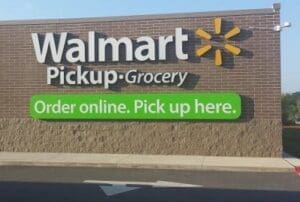 Even with a labor shortage, large retailers are gearing up for the holiday season by bringing in hundreds of thousands of employees ahead of the shopping and shipping surge. Walmart announced this week that it is planning to hire about 150,000 new US store workers, most of them permanent and full-time, in preparation for the busy holiday season. Walmart had previously announced it would hire 20,000 workers in its supply chain facilities to permanent roles as people have increasingly adopted curbside pickup and delivery during the Covid pandemic. On the heels of a similar announcement by Target, the company will also offer extra hours to many of its store workers during this period. To help with talent acquisition and retention, Walmart has also raised its average hourly wage to $16.40.
Even with a labor shortage, large retailers are gearing up for the holiday season by bringing in hundreds of thousands of employees ahead of the shopping and shipping surge. Walmart announced this week that it is planning to hire about 150,000 new US store workers, most of them permanent and full-time, in preparation for the busy holiday season. Walmart had previously announced it would hire 20,000 workers in its supply chain facilities to permanent roles as people have increasingly adopted curbside pickup and delivery during the Covid pandemic. On the heels of a similar announcement by Target, the company will also offer extra hours to many of its store workers during this period. To help with talent acquisition and retention, Walmart has also raised its average hourly wage to $16.40.
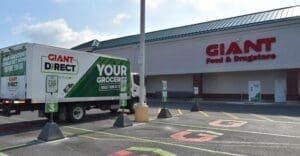 More and more companies are looking to improve delivery speeds, and grocery stores are at the top of the list. The Giant Company announced a partnership with Instacart to provide high-speed deliveries from Giant and Martin’s supermarkets. The company said that about 20,000 items are available via Giant Instant Delivery and Martin’s Instant Delivery, such as prepared foods, snacks, and beverages, as well as “last-minute” items like paper goods, household cleaners, and baby care products. The service, which requires a $10 order minimum and carries a $2.99 delivery fee, is available from 6am to midnight. Plans call for 30-minute convenience delivery to become available via Giant’s and Martin’s websites and mobile apps in the coming months, enabled by Instacart Enterprise services.
More and more companies are looking to improve delivery speeds, and grocery stores are at the top of the list. The Giant Company announced a partnership with Instacart to provide high-speed deliveries from Giant and Martin’s supermarkets. The company said that about 20,000 items are available via Giant Instant Delivery and Martin’s Instant Delivery, such as prepared foods, snacks, and beverages, as well as “last-minute” items like paper goods, household cleaners, and baby care products. The service, which requires a $10 order minimum and carries a $2.99 delivery fee, is available from 6am to midnight. Plans call for 30-minute convenience delivery to become available via Giant’s and Martin’s websites and mobile apps in the coming months, enabled by Instacart Enterprise services.
 Speaking of fast home delivery, DoorDash is expanding its offerings with new partnerships. DoorDash is extending its restaurant delivery reach in a partnership with Los Angeles-based online ordering platform Dylish, which serves some 300 restaurants. Dylish offers restaurants a three-tiered, monthly subscription service that provides customized apps and a range of logistical and marketing assets. Prior to its deal with DoorDash, Dylish linked restaurants that did not have delivery drivers with Postmates. Restaurants pay Dylish $49, $99, or $129 monthly, depending on the range of services they choose. The company says its delivery fee charges can be “as low as 10 percent” per order. This news comes about a week after DoorDash began to offer delivery of beer, wine, and spirits in 20 states, and launched an extensive partnership with Bed Bath & Beyond.
Speaking of fast home delivery, DoorDash is expanding its offerings with new partnerships. DoorDash is extending its restaurant delivery reach in a partnership with Los Angeles-based online ordering platform Dylish, which serves some 300 restaurants. Dylish offers restaurants a three-tiered, monthly subscription service that provides customized apps and a range of logistical and marketing assets. Prior to its deal with DoorDash, Dylish linked restaurants that did not have delivery drivers with Postmates. Restaurants pay Dylish $49, $99, or $129 monthly, depending on the range of services they choose. The company says its delivery fee charges can be “as low as 10 percent” per order. This news comes about a week after DoorDash began to offer delivery of beer, wine, and spirits in 20 states, and launched an extensive partnership with Bed Bath & Beyond.
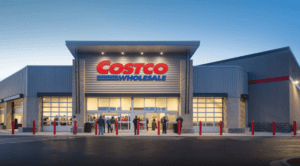 The global shipping crisis is not going away any time soon, and it is becoming harder and harder to get goods on a boat. Following in the footsteps of Home Depot, Costco is renting its own container ships to prevent delays and keep costs down. Costco CFO Richard Galanti said the company had chartered three ships to import products from Asia to the US and Canada. Galanti said this will help Costco avoid spending six times the normal price on shipping or containers through a third party. Each ship can carry between 800 and 1,000 containers at a time, and the company has leased several thousand containers for use on these ships. Costco expects to make about 10 deliveries over the next year using these ships, accounting for about 20 percent of its imports from Asia
The global shipping crisis is not going away any time soon, and it is becoming harder and harder to get goods on a boat. Following in the footsteps of Home Depot, Costco is renting its own container ships to prevent delays and keep costs down. Costco CFO Richard Galanti said the company had chartered three ships to import products from Asia to the US and Canada. Galanti said this will help Costco avoid spending six times the normal price on shipping or containers through a third party. Each ship can carry between 800 and 1,000 containers at a time, and the company has leased several thousand containers for use on these ships. Costco expects to make about 10 deliveries over the next year using these ships, accounting for about 20 percent of its imports from Asia
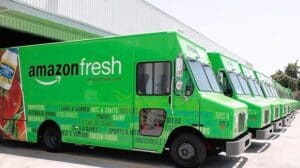 After offering free grocery delivery for Prime members who bought more than $35 worth of groceries since 2018, Amazon is changing things with its Whole Foods grocery delivery service. Starting later this month, Amazon is tacking on a $9.95 delivery fee to Prime orders of Whole Foods’ items across the US. A Whole Foods spokesperson said the add-on expense will help the chain avoid raising prices on its products and offset rising operating costs for delivery orders, including equipment and technology. The fee will not impact grocery pickup orders or Amazon’s grocery delivery service, Amazon Fresh, which is available in select markets.
After offering free grocery delivery for Prime members who bought more than $35 worth of groceries since 2018, Amazon is changing things with its Whole Foods grocery delivery service. Starting later this month, Amazon is tacking on a $9.95 delivery fee to Prime orders of Whole Foods’ items across the US. A Whole Foods spokesperson said the add-on expense will help the chain avoid raising prices on its products and offset rising operating costs for delivery orders, including equipment and technology. The fee will not impact grocery pickup orders or Amazon’s grocery delivery service, Amazon Fresh, which is available in select markets.
 The supply chain capacity crunch has caused prices to rise for a number of goods. And cotton is joining the list of materials with soaring prices. Cotton futures raced past $1 a pound for the first time in nearly a decade as adverse weather and shipping snags threaten supplies, driving up costs for clothing around the world. Crops in several key-growing countries are seeing problems, from rain-drenched fields in the US to bollworm-infested ones in India. High freight rates and growing geopolitical tensions are also driving up costs. For example, growing concern over labor violations in Xinjiang, which is China’s largest producing region, has caused the US to ban imports from the region.
The supply chain capacity crunch has caused prices to rise for a number of goods. And cotton is joining the list of materials with soaring prices. Cotton futures raced past $1 a pound for the first time in nearly a decade as adverse weather and shipping snags threaten supplies, driving up costs for clothing around the world. Crops in several key-growing countries are seeing problems, from rain-drenched fields in the US to bollworm-infested ones in India. High freight rates and growing geopolitical tensions are also driving up costs. For example, growing concern over labor violations in Xinjiang, which is China’s largest producing region, has caused the US to ban imports from the region.
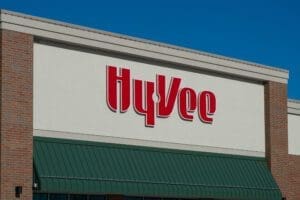 Robots have become part of the logistics landscape for a while now. While the most practical use has been in the warehouse, many companies have deployed robots in the store for a variety of tasks. This has been especially true for grocery stores as they work to improve inventory accuracy and get a better sense of what is available on shelves. Hy-Vee is bringing robotic aisle-scanning technology to five of its grocery stores in Iowa, Missouri, and Nebraska, the grocery chain announced this week. The devices, supplied by Simbe Robotics and known as Tally, roam aisles autonomously, using high-resolution cameras to track items on shelves. Hy-Vee is the latest U.S. supermarket operator to adopt the robots, which are also in use at stores run by Save Mart, Schnuck Markets, and Giant Eagle.
Robots have become part of the logistics landscape for a while now. While the most practical use has been in the warehouse, many companies have deployed robots in the store for a variety of tasks. This has been especially true for grocery stores as they work to improve inventory accuracy and get a better sense of what is available on shelves. Hy-Vee is bringing robotic aisle-scanning technology to five of its grocery stores in Iowa, Missouri, and Nebraska, the grocery chain announced this week. The devices, supplied by Simbe Robotics and known as Tally, roam aisles autonomously, using high-resolution cameras to track items on shelves. Hy-Vee is the latest U.S. supermarket operator to adopt the robots, which are also in use at stores run by Save Mart, Schnuck Markets, and Giant Eagle.
That’s all for this week. Enjoy the weekend and the song of the week, The Who’s Tommy Can You Hear Me?

















